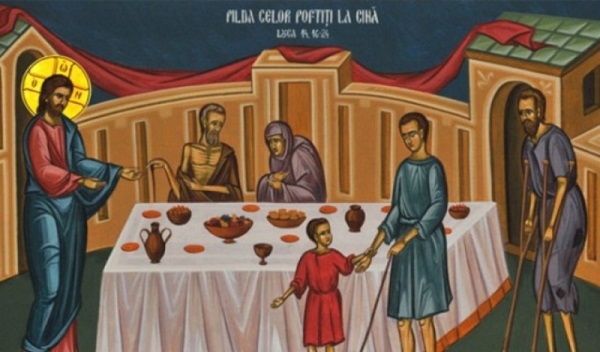Second Sunday after Trinity
“Then the master told his servant, ‘Go out to the
roads and country lanes and make them come in, so that my house will be full. I
tell you, not one of those men who were invited will get a taste of my banquet’”
(Luke 14:23-24).
In ancient times, it was common practice to send an
invitation to a banquet such as the one described in the parable Jesus tells,
followed by a summons when the time for the gathering arrived (Concordia Publishing House 2009) . It would certainly
be considered rude to receive the first invitation, and to reject the second
call (Kretzmann 1921) . The servant in the
parable is delivering the second call, or summons.
In the parable of the Great Banquet, God invites His
people, the Jews, to the banquet and they refuse the invitation. The people who
receive the invitation in the parable are preoccupied with their sin. They
persevere in sins without repentance, and they reject the gracious invitation (McCain 2005) . The excuses given
by the invited guests for why they were rejecting the invitation all involve
worldly concerns. They are concerned with their immediate circumstances and
happiness. They are fixated on finding happiness, fulfillment, or salvation in
their businesses, their property, and their familial relationships. They should
instead be looking forward to the joys of the banquet to which they had been
invited (Kretzmann 1921) . The fact that the
excuses of the invited guests are all temporal in nature implies that Israel, as
a group, was focused on earthly things. They were looking for a political
fulfillment of God’s promise to raise up David’s fallen tent.[1]
They expected the Messiah to build an earthly kingdom, and to redeem Israel in
a political way by making them a great nation as they were under King David (Kretzmann 1921) .
God, the master in this parable, sent the invitation
to His great banquet to His chosen guests through Moses and the prophets. John
the Baptist came as the herald announcing that the time had come. The kingdom
of God, which is the preaching of Christ, was at hand. All the invited guests
should come to the banquet (Kretzmann 1921) . But Israel, as a
whole, rejected the invitation. Jesus turns from the Jews, though He longed to
gather them as a hen gathers her chicks, because they refused to be so
gathered.[2]
He invites the spiritually blind, poor, and lame: tax collectors and sinners,
and gentiles. They will fill his house.
No one can come to the banquet without an
invitation. God, however, has invited all people through His word. He who
remains outside of the banquet only has himself to blame (Prange 1988) .
God would indeed be a liar and a hypocrite if His invitation were extended to
all people through His word, but secretly in His heart He knew there were some
people He would damn anyway, no matter what. God condemns this type of
wickedness.[3] Man is, however,
responsible for his own damnation by resisting and rejecting the Holy Spirit as
He works through God’s word (McCain 2005) . Since man cannot
desire what is spiritually good because of his corrupt nature, man must be
compelled by the preaching of the Law to know his helplessness. When this work
of showing man his sin, and his need for a Savior is done, he is given the good
news of the Gospel: that at just the right time, while we were still sinners
and enemies of God, Christ died as the atonement for our sins, and the sins of
the whole world; and that Jesus rose from the dead for our justification. God
drives and gathers His elect together in this way (Kretzmann 1921) . Those people who despise God’s call
through the preaching of the Law and Gospel are barred from God’s house, and
the wedding feast of the Lamb, by their own fault (Kretzmann 1921) .
The parable of the Great Banquet shows that multitudes
of people will enter the kingdom of heaven, though Jesus doesn’t give a
specific number (Prange 1988) . This filling of the
house for the great banquet should call to mind the vision of John recorded in
Revelation 7: John heard the number of the Elect – 144,000. But when he looked,
he saw many more people than that specific number. He saw a great multitude
that no one could count, from every nation, tribe, people, and language before
the throne and in front of the Lamb.[4]
God does not desire the death of the wicked, but that he would turn from his
evil ways and live.[5] The guests who refuse the
invitation to the banquet are the Jews. Those brought into the banquet in their
stead are the gentiles. The point is, God prepares the banquet, makes the
invitation, brings in the guests, and even provides the proper clothing to His
guests.[6]
No one can force his way into the banquet; he can only refuse to come. And
Jesus warns Jew and gentile alike that God’s judgment will fall on all those
who show contempt for His word. ###
Bibliography
Concordia Publishing House. The Lutheran Study Bible. Edited by
Edward A Engelbrecht, et al. Saint Louis, MO: Concordia Publishing House, 2009.
Kretzmann,
Paul E. Popular Commentary of the Bible: New Testament. Vol. 1. 2 vols.
St. Louis: Concordia Publishing House, 1921.
McCain,
Paul T., et. al., ed. Concordia: The Lutheran Confessions. A reader's
edition of the Book of Concord. 1st. St. Louis: Concordia Publishing House,
2005.
Pieper,
Francis. Christian Dogmatics. Vol. 1. ebook. St. Louis, 1950.
Prange,
Victor H. The People's Bible Commentary: Luke. Milwaukee: Northwestern
Publishing House, 1988.
[1]
Amos 9:11; Acts 15:14-19
[2]
Matthew 23:37
[3]
Psalm 5:9; 12:2-4
[4]
Revelation 7:4, 9
[5]
Ezekiel 18:30-32; 33:19; 2 Peter 3:9
[6]
Matthew 22:1-14

No comments:
Post a Comment